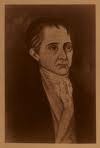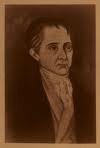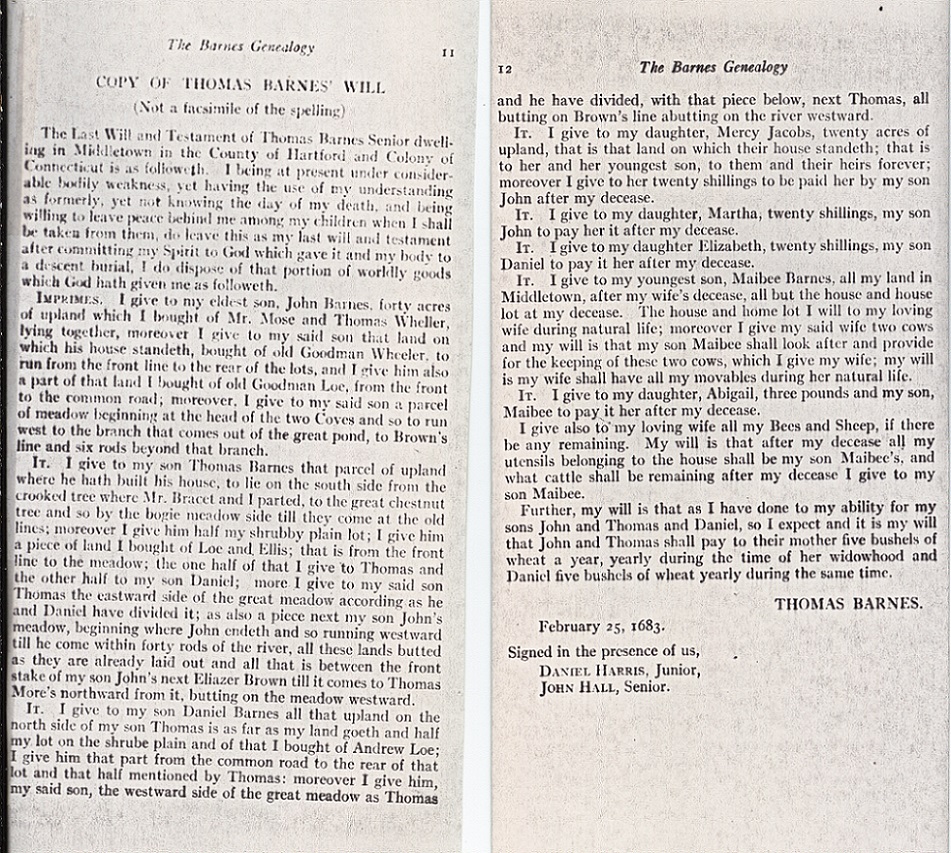*Please do not confuse this Memorial with the other Thomas Barnes. Little is known about Thomas Barnes' parentage. He is often called "Thomas of New Haven" to distinguish him from other Thomas Barnes' of the era.
Thomas Barnes arrived on the ship William and John with 101 passengers that landed in Boston 1635. In 1636 he became a Proprietor of Hartford, Ct.; a soldier in Pequot Battle of 1637; Sergeant of Farmington Train Band, 1651; admitted as freeman, 1669; received 50 acres for service in Pequot War, 1671. A Thomas Barnes appeared on the Freeman List of the Massachusetts Bay Colony 1630-1645. He became a Freeman - a man who could vote because he took the oath of allegiance to the government of the colony and joined the church - in May 1645 at Hingham, Massachusetts.
He was one of the soldiers in the Pequot War fought in 1637. The Pequot War (1637), the first major conflict between Indians and whites in New England, set a brutal precedent for subsequent Indian-white warfare. The Pequot's were accused of murdering two white men but refused to yield up the suspected killers. Puritan authorities decided to retaliate, a decision reinforced by Pequot resistance against new Connecticut settlements. On May 26, 1637, a force of white soldiers together with Mohegan and Narragansett warriors attacked the principal Pequot village, burned it, and slaughtered its inhabitants. The surviving Pequot's were relentlessly pursued, until the tribe was largely destroyed. . In 1639, Thomas Barnes received land grants from the Colony for that service: 6 acres in Hartford and later 50 acres in Farmington, where he settled with the first party in 1646. Farmington at this early period included the territory of Southington, New Britain, Plainville, Bristol, Burlington, and Avon of the present day. After 1646, he resided in Farmington until his death.
The Last Will and Testament of Thomas Barnes Senior dwelling in Middletown in the county of Hartford and Colony of Connecticut is as followeth. I being at present under considerable bodily weakness, yet having the use of my understanding as formerly, yet not knowing the day of my death, and being willing to leave peace behind me among my children when I shall be taken from them, do leave this as my last will and testament after committing my Spirit to God which gave it and my body to a descent burial, I do dispose of that portion of worldly goods which God hath given me as followeth.
IMPRIMES I give to my eldest son, John Barnes, forth acres of upland which I bought of Mr. Mose and Thomas Wheller, lying together, moreover I give to my said son that land on which his house standeth, bought of old Goodman Wheeler, to run from the front line to the rear of the lots, and I give him also a part of that land I bought of old Goodman Loe, from the front to the common road; moreover, I give to my said son a parcel of meadow beginning at the head of the two Coves and so to run west to the branch that comes out of the great pond, to Brown's line and six rods beyond that branch.
IT I give to my son Thomas Barnes that parcel of upland where he hath built his house, to lie on the south side from the crooked tree where Mr. Bracet and I parted, to the great chestnut tree and so by the bogie meadow side till they come at the old lines; moreover I give him half my shrubby plain lot; I give him a piece of land I bought of Loe and Ellis; that is from the front line to the meadow; the one half of that I give to Thomas and the other half to my son Daniel; more I give to my said son Thomas the eastward side of the great meadow according qas he and Daniel have divided it; as also a piece next my son John's meadow, beginning where John endeth and so running westward till he come within forty rods of the river, all these lands butted as they are already laid out and all that is between the front stake of my son John's next Eliazer Brown till it comes to Thomas More's northward from it, butting on the meadow westward.
IT I give to my son Daniel Barnes all that upland on the north side of my son Thomas is as far as my land goeth and half my lot on the shrube plain and of that I bought of Andrew Loe; I give him that part from the common road to the rear of that lot and that half mentioned by Thomas; moreover I give him, my said son, the westward side of the great meadow as Thomas and he have devided with that piece below, next Thomas, all butting on Brown's line abutting on the river westward.
IT I give to my daughter, Mercy Jacobs, twenty acres of upland, that is that land on which their house standeth; that is to her and her youngest son, to them and their heirs forever; moreover I give to her twenty shillings to be paid her by my son John after my decease.
IT I give to my daughter Martha, twenty shillings, my son John to pay her it after my decease.
IT I give to my daughter Elizabeth, twenty shillings, my son Daniel to pay it her after my decease.
*The New Haven Genealogical Magazine, Donald Lines Jacobus, 1922, Volume 1 page 115 has him listed as passing away in New Haven, though there is no supporting evidence.
*Please do not confuse this Memorial with the other Thomas Barnes. Little is known about Thomas Barnes' parentage. He is often called "Thomas of New Haven" to distinguish him from other Thomas Barnes' of the era.
Thomas Barnes arrived on the ship William and John with 101 passengers that landed in Boston 1635. In 1636 he became a Proprietor of Hartford, Ct.; a soldier in Pequot Battle of 1637; Sergeant of Farmington Train Band, 1651; admitted as freeman, 1669; received 50 acres for service in Pequot War, 1671. A Thomas Barnes appeared on the Freeman List of the Massachusetts Bay Colony 1630-1645. He became a Freeman - a man who could vote because he took the oath of allegiance to the government of the colony and joined the church - in May 1645 at Hingham, Massachusetts.
He was one of the soldiers in the Pequot War fought in 1637. The Pequot War (1637), the first major conflict between Indians and whites in New England, set a brutal precedent for subsequent Indian-white warfare. The Pequot's were accused of murdering two white men but refused to yield up the suspected killers. Puritan authorities decided to retaliate, a decision reinforced by Pequot resistance against new Connecticut settlements. On May 26, 1637, a force of white soldiers together with Mohegan and Narragansett warriors attacked the principal Pequot village, burned it, and slaughtered its inhabitants. The surviving Pequot's were relentlessly pursued, until the tribe was largely destroyed. . In 1639, Thomas Barnes received land grants from the Colony for that service: 6 acres in Hartford and later 50 acres in Farmington, where he settled with the first party in 1646. Farmington at this early period included the territory of Southington, New Britain, Plainville, Bristol, Burlington, and Avon of the present day. After 1646, he resided in Farmington until his death.
The Last Will and Testament of Thomas Barnes Senior dwelling in Middletown in the county of Hartford and Colony of Connecticut is as followeth. I being at present under considerable bodily weakness, yet having the use of my understanding as formerly, yet not knowing the day of my death, and being willing to leave peace behind me among my children when I shall be taken from them, do leave this as my last will and testament after committing my Spirit to God which gave it and my body to a descent burial, I do dispose of that portion of worldly goods which God hath given me as followeth.
IMPRIMES I give to my eldest son, John Barnes, forth acres of upland which I bought of Mr. Mose and Thomas Wheller, lying together, moreover I give to my said son that land on which his house standeth, bought of old Goodman Wheeler, to run from the front line to the rear of the lots, and I give him also a part of that land I bought of old Goodman Loe, from the front to the common road; moreover, I give to my said son a parcel of meadow beginning at the head of the two Coves and so to run west to the branch that comes out of the great pond, to Brown's line and six rods beyond that branch.
IT I give to my son Thomas Barnes that parcel of upland where he hath built his house, to lie on the south side from the crooked tree where Mr. Bracet and I parted, to the great chestnut tree and so by the bogie meadow side till they come at the old lines; moreover I give him half my shrubby plain lot; I give him a piece of land I bought of Loe and Ellis; that is from the front line to the meadow; the one half of that I give to Thomas and the other half to my son Daniel; more I give to my said son Thomas the eastward side of the great meadow according qas he and Daniel have divided it; as also a piece next my son John's meadow, beginning where John endeth and so running westward till he come within forty rods of the river, all these lands butted as they are already laid out and all that is between the front stake of my son John's next Eliazer Brown till it comes to Thomas More's northward from it, butting on the meadow westward.
IT I give to my son Daniel Barnes all that upland on the north side of my son Thomas is as far as my land goeth and half my lot on the shrube plain and of that I bought of Andrew Loe; I give him that part from the common road to the rear of that lot and that half mentioned by Thomas; moreover I give him, my said son, the westward side of the great meadow as Thomas and he have devided with that piece below, next Thomas, all butting on Brown's line abutting on the river westward.
IT I give to my daughter, Mercy Jacobs, twenty acres of upland, that is that land on which their house standeth; that is to her and her youngest son, to them and their heirs forever; moreover I give to her twenty shillings to be paid her by my son John after my decease.
IT I give to my daughter Martha, twenty shillings, my son John to pay her it after my decease.
IT I give to my daughter Elizabeth, twenty shillings, my son Daniel to pay it her after my decease.
*The New Haven Genealogical Magazine, Donald Lines Jacobus, 1922, Volume 1 page 115 has him listed as passing away in New Haven, though there is no supporting evidence.
Family Members
Advertisement
Explore more
Sponsored by Ancestry
Advertisement





